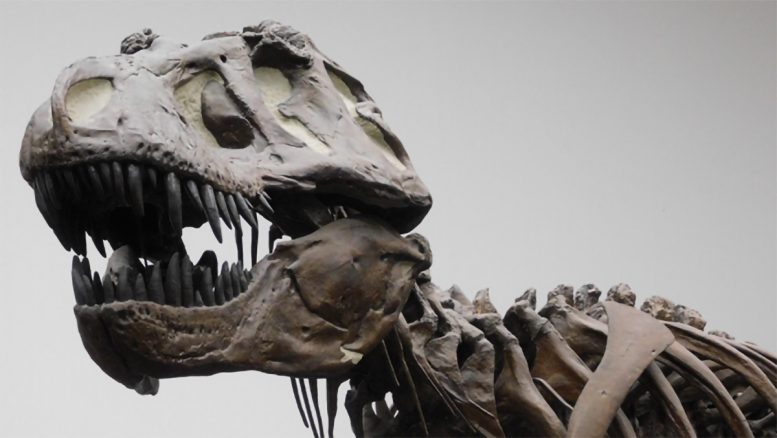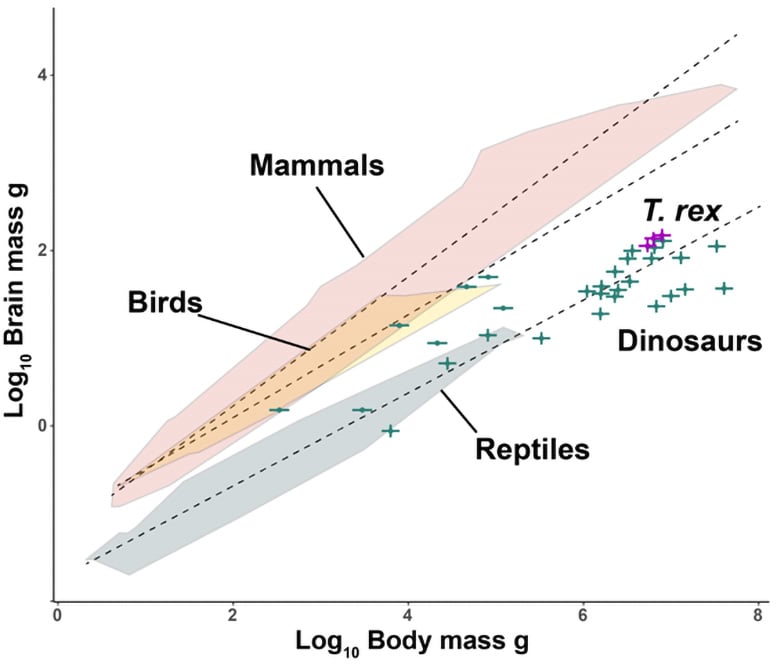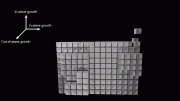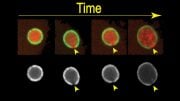
Image of a T. rex skeletal cast at Senckenberg Museum Frankfurt, Germany. T. rex lived at the end of the Cretaceous (about 66 million years ago) and was exclusive to western North America. Credit: Kai R. Caspar
Dinosaurs were as smart as reptiles but not as intelligent as monkeys, as former research suggests.
An international team of paleontologists, behavioral scientists, and neurologists have re-examined brain size and structure in dinosaurs and concluded they behaved more like crocodiles and lizards.
In a study published last year, it was claimed that dinosaurs like T. rex had an exceptionally high number of neurons and were substantially more intelligent than assumed. It was claimed that these high neuron counts could directly inform on intelligence, metabolism and life history, and that T. rex was rather monkey-like in some of its habits. Cultural transmission of knowledge as well as tool use were cited as examples of cognitive traits that it might have possessed.
Critique of Neuron Count Methodology
However the new study, published in The Anatomical Record, involving the University of Bristol’s Hady George, Dr.Darren Naish (University of Southampton) led by Dr Kai Caspar (Heinrich Heine University) with Dr Cristian Gutierrez-Ibanez (University of Alberta) and Dr Grant Hurlburt (Royal Ontario Museum) takes a closer look at techniques used to predict both brain size and neuron numbers in dinosaur brains. The team found that previous assumptions about brain size in dinosaurs, and the number of neurons their brains contained, were unreliable.

Relationship between brain and body mass in land-living vertebrates. Dinosaurs like T. rex have brain to body size ratios similar to those of living reptiles. Credit: Cristian Gutierrez-Ibanez
The research follows decades of analysis in which paleontologists and biologists have examined dinosaur brain size and anatomy, and used these data to infer behavior and lifestyle. Information on dinosaur brains comes from mineral infillings of the brain cavity, termed endocasts, as well as the shapes of the cavities themselves.
The team found that their brain size had been overestimated – especially that of the forebrain – and thus neuron counts as well. In addition, they show that neuron count estimates are not a reliable guide to intelligence.
Recommendations for Future Research
To reliably reconstruct the biology of long-extinct species, the team argues, researchers should look at multiple lines of evidence, including skeletal anatomy, bone histology, the behavior of living relatives, and trace fossils. “Determining the intelligence of dinosaurs and other extinct animals is best done using many lines of evidence ranging from gross anatomy to fossil footprints instead of relying on neuron number estimates alone,” explained Hady from Bristol’s School of Earth Sciences.
Dr Kai Caspar explained: “We argue that it’s not good practice to predict intelligence in extinct species when neuron counts reconstructed from endocasts are all we have to go on.”
“Neuron counts are not good predictors of cognitive performance, and using them to predict intelligence in long-extinct species can lead to highly misleading interpretations,” added Dr Ornella Bertrand (Institut Català de Paleontologia Miquel Crusafont).
“The possibility that T. rex might have been as intelligent as a baboon is fascinating and terrifying, with the potential to reinvent our view of the past,” concluded Dr. Darren Naish. “But our study shows how all the data we have is against this idea. They were more like smart giant crocodiles, and that’s just as fascinating.”
Reference: “How smart was T. rex? Testing claims of exceptional cognition in dinosaurs and the application of neuron count estimates in palaeontological research” by Kai R. Caspar, Cristián Gutiérrez-Ibáñez, Ornella C. Bertrand, Thomas Carr, Jennifer A. D. Colbourne, Arthur Erb, Hady George, Thomas R. Holtz, Darren Naish, Douglas R. Wylie and Grant R. Hurlburt, 26 April 2024, The Anatomical Record.
DOI: 10.1002/ar.25459









Oh yeah… Now you bad mouth and insult dinosaurs. Why didn’t you tell me last week? Come on guys…
In related news, dinosaur scientists report humans are not as smart as they once thought they were…
I do not believe that there has ever been any behavioral evidence that T Rex was very intelligent. I do not believe it is meaningful to compare T Rex intelligence with contemporary animals like primates. It may be productive to compare the evidence of the degree and nature of intelligence among the related Therapods and other related animals in the past.